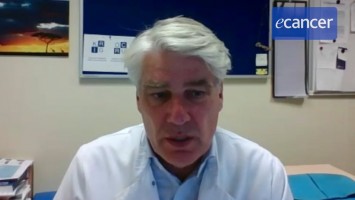The background of the COSMIC-311 study was to determine whether or not cabozantinib might have activity in patients who have already failed a prior VEGF receptor inhibitor for treatment of their RI refractory differentiated thyroid cancer. Historically these patients had already been treated in the last ten years with either lenvatinib, sorafenib or sometimes other VEGF receptor inhibitors, lenvatinib and sorafenib being the two that are FDA approved. However, over time patients develop progressive disease so this was a high unmet need. The patients were then going to be randomised as a placebo-controlled trial to see whether or not cabozantinib could be used in this setting effectively to help control the patients’ cancer.
What were the key findings?
The trial design actually allowed for two different primary endpoints. The first primary endpoint was the progression free survival and the other primary endpoint was the overall response rate of the first 100 patients following six months of treatment. Because of the design there was a planned interim analysis at the time of the first 100 patients at six months of treatment. At that time the data safety monitoring committee looked at the data and the primary endpoint of progression free survival had been met where the hazard ratio was 0.22 and the progression free survival of patients on the placebo arm was 1.9 months and the progression free survival of patients who were on the treatment arm had not been reached. So this was meeting the primary endpoint of progression free survival.
The second primary endpoint, the overall response rate, was around 15%. The hazard ratio was 0.59 and this actually was not statistically significant. The p-value was 0.025 but that was not as part of the statistical plan considered statistically significant. So it did meet one of the two primary endpoints, according to the study design this meant that the patient met its primary endpoint and therefore was declared a positive trial.
Due to the fact that it had reached its primary endpoint, the data safety monitoring committee felt that future enrolment should be halted and that was done and patients were then followed from there.
How can these results impact the future treatment of thyroid cancer?
The future treatment of thyroid cancer depends on our having continued available effective therapies. So by the results of this study we have shown now that cabozantinib can be very effective in the setting of patients who have had a prior VEGF receptor inhibitor. Of note, 63% of these patients had had prior lenvatinib, this is the first time that activity has been shown in a randomised controlled trial following treatment with lenvatinib. Most patients had had either lenvatinib or sorafenib or both prior to treatment.
What was interesting about the placebo arm was it shows that these patients have very aggressive disease with a progression free survival of only 1.9 months. That means that these patients badly need not only additional therapy but they need to know what that therapy is going to be prior to actually having progression on their prior therapy. So it was important for us to actually identify this. Now we know that patients who have progressed on these agents, one, progressed rapidly and soon need another agent and the results from this study have shown that cabozantinib can be this agent and will be active in this setting.
One other final point is that the safety of cabozantinib was also documented in this study and the adverse events were not that different from previously identified adverse events with cabozantinib in other settings. So what we really see is that we have a response rate of 15% versus 0% in the placebo arm, we have a progression free survival not met versus 1.9 months and, taken together between the safety and these two outcomes, I think it shows that cabozantinib really should be the next line treatment for patients with advanced thyroid cancer.








